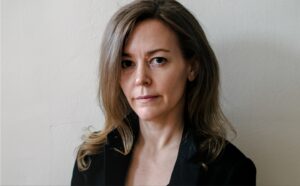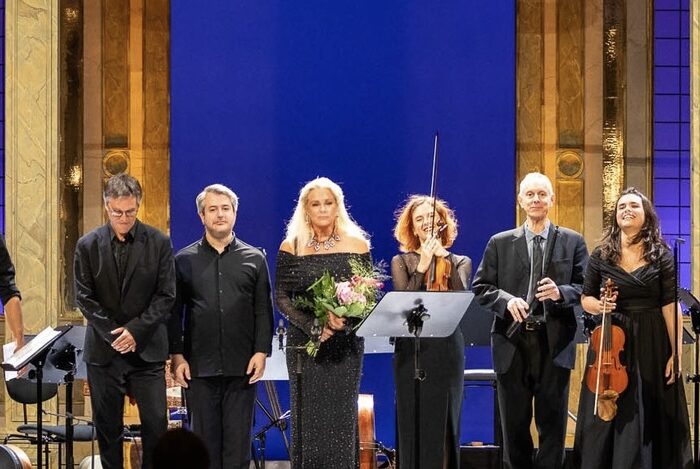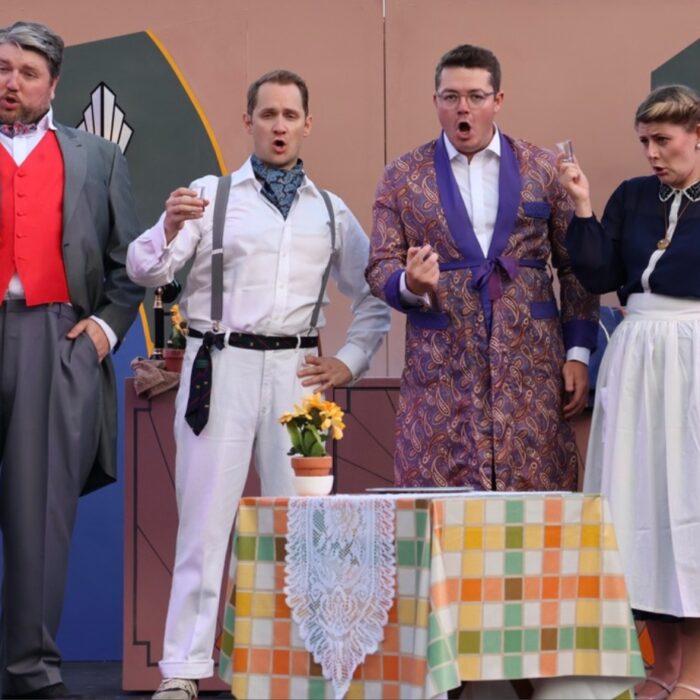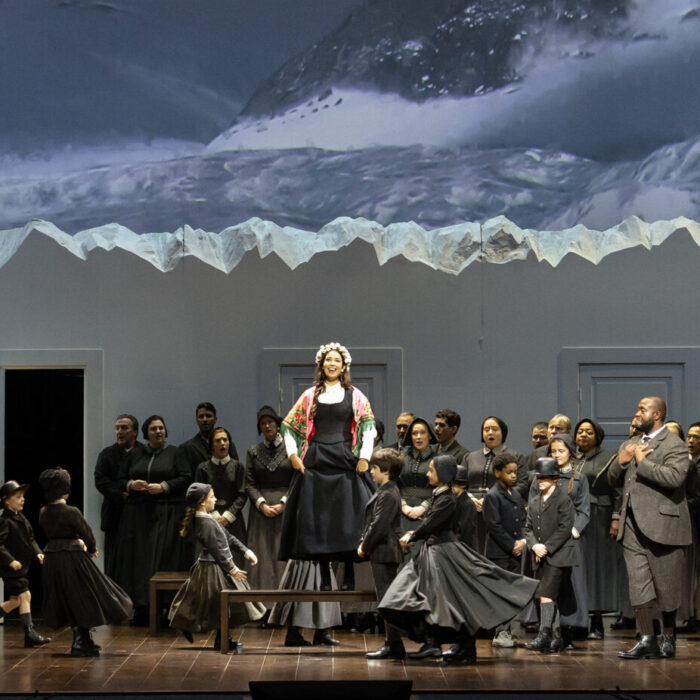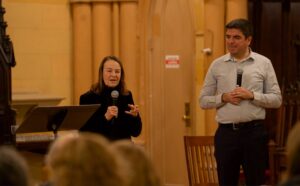
Brooklyn Art Song Society 2023-24 Review: Circles V – The Minnesota Connection
By Jennifer Pyron(Photo: Catherine Hancock)
Brooklyn Art Song Society (BASS) presented “Circles V: The Minnesota Connection” on Friday, February 2nd 2024 at First Unitarian Church of Brooklyn.
The program focused on works by Michael Djupstrom, Libby Larsen, Reinaldo Moya, and Dominick Argento. The pre-lecture before the program began featured Larsen and Moya discussing their works and the Minnesota connection. Larsen’s comments about her work, “The Other Side of Silence (BASS Commission),” were thoughtfully crafted and engaging. She described how her “deep reverence for the human voice and a respect for what it can carry” guided her when making this song cycle. When Moya asked Larsen about what she hoped audience members would learn from her songs, Larsen opened up more about her core message. “My song cycle, ‘The Other Side of Silence,’ was commissioned by BASS and [pianist] Mike Brofman’s deep love for the writing of George Eliot. [Brofman] asked me to extract themes and craft them down into a song cycle text, which is kind of like climbing Mount Everest blindfolded. So, I drew fragments and created a theme that George Eliot is brilliant in talking about, which is the human need to put brackets on infinity. To mark the beginning, end and middle based on humans having this need to create an alpha and omega. This song cycle is about that,” said Larsen. “‘Commonplace’ is the most difficult part of this cycle, especially when the text says ‘I must die – and soon.’ This was written during the pandemic and is my recognition of mortality, the living on both sides where life can be death and death can be life,” explained Larsen.
Moya added how he connected with Larsen in this space of contemplating infinity and one’s connection to cycles. He described how his work, “Nocturno,” was also commissioned by BASS during a time when he was coming out of the darkness and into the light post-pandemic. This through-line of existential questioning soon became the Minnesota connection that turned this evening’s program into a rather unique and surprising experience.
Three Teasdale Songs
Michael Djupstrom’s “Three Teasdale Songs,” featuring poems by Sara Teasdale, were performed by Minneapolis, Minnesota soprano Tori Tedeschi Adams and pianist Mike Brofman. Adams’ voice opened the song cycle with a warm embrace full of richness and vitality. Brofman played “I Would Live in Your Love” with undulating waves of introspection that worked very well with Adams’ tender-sounding voice. What made this song cycle the most impressive was the clarity and articulate phrasing of text by Adams. It was like her voice was both a narrator and receiver, cycling into herself the hidden meanings between the lines of Teasdale’s poems. In other words, this felt like an intimate journal being voiced in real time. It was fascinating and deeply felt among listeners.
Adams’ voice developed a larger palette of sound and colors as the song cycle progressed, but one might have been most pleasantly surprised by her toned down volume, which made her that much more intriguing. For me personally, I listen to an array of singers with bigger voices that can only hope to exude the amount of authenticity that Adams so naturally possessed during her performance. In this way, one might have been able to sit back and enjoy a little bit more. This connection to the simple pleasures of a really beautiful live performance stood out above all.
The Other Side of Silence
Libby Larsen’s “The Other Side of Silence” was also performed by Adams and Brofman. There was a special fondness felt from Adams towards this song cycle that elevated the evening into a space of transcendence. The combination of Larsen’s music with the text was one element of this; however, Adams’ voice absolutely made this connection possible. This was a match made for the books. Adams blossomed into her higher registers with ease and soaring heights. Her connection to her breath was grounded and this allowed her voice to develop into something more. “Harvest and Springtime” showcased her excellent English diction, especially as she sang the words “anew” and the final phrase, “Springtime and harvest and springtime.” This was a beautiful example of vocal phrasing and diction that elongated the tone in support, without reducing its quality. “Commonplace” was another highlight of this cycle, when Adams’ voice mirrored the text “suddenly, acute, transformed into consciousness” with aplomb. This resolving of a means to an end reiterated what Larsen had said in her pre-lecture about contemplating mortality and infinity. One might want to listen to this live performance and/or recording again. It was that remarkable.
Nocturno
Reinaldo Moya‘s “Nocturno” was performed by baritone Jesse Blumberg and Brofman. The opening piano of this song cycle was mysterious and magical. It is important to note how throughout BASS’ 2023-24 season, Brofman consistently played with this sensation, uncovering that which lies between the notes. If one has not heard Brofman play live, please put this on your radar. The hairs on the back on one’s neck will definitely raise in awareness. This sensation became the glue that made Moya’s “Nocturno” song cycle feel both timeless and present in the same space.
Blumberg’s voice was a gentle interpreter of the text and messages. He relaxed into an internal place of discovery that carried into one song after another, like an observer of life’s mysteries. His vocal tone was smooth and refined as he leaned into the longer phrases, inviting listeners to draw upon their own meanings and connections.
The Andrée Expedition
Dominick Argento’s “The Andrée Expedition” was performed by baritone Randall Scarlata and pianist Laura Ward. It is important to read the program’s note about this song cycle which includes Argento’s intention for this work: “Andrée, Strindberg, and Frænkel began their expedition on July 11, 1897. Their records break off three months later. Thirty-three years later their bodies were discovered and returned to Sweden, at which time the diaries and notebooks of Andrée and Strindberg were published: most of the text for this cycle is taken directly from them. Frænkel left no account behind, but the text assigned to him is partially based on his companions’ writings.”
Scarlata’s interpretation of this song cycle was extraordinary. He managed to portray the writings in an accessible way full of empathy and understanding towards Argento’s well-crafted composition storyline. One could tell Scarlata studied and applied his voice to conveying the text with as real of an interpretation as possible. This was not meant for entertainment purposes, per se; instead Scarlata’s voice illuminated Argento’s ability to personalize writing through music. Every song was either a journal entry or letter, and Scarlata’s delivery of this work enabled listeners to easily make sense of it all.
“The Balloon Rises” highlighted a moment when Scarlata’s voice and Ward’s piano playing were sublime as they captured the imagery of the text, “A blackbird circles a moment in the distance, then disappears in the fog. The sun has gone. Goodnight.”
